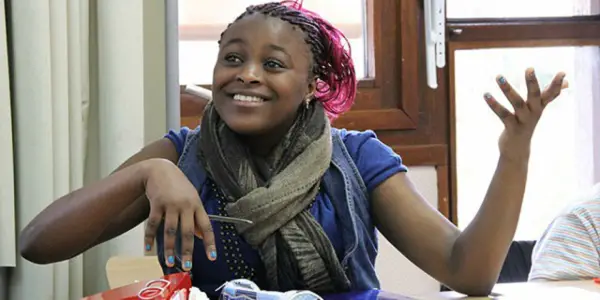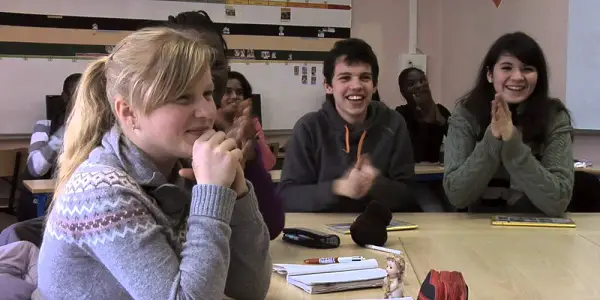SCHOOL OF BABEL: A Band Apart

Lee Jutton has directed short films starring a killer toaster,…
Director Julie Bertuccelli’s observational documentary School of Babel tells the story of a group of students between the ages of 11 and 15 in a special “reception class” at La Grange aux Belles in Paris. Hailing from a wide range of countries including Ukraine, China, Libya and Brazil, the students have one major thing in common: they are all new to France and, under the guidance of their teacher Brigitte Cervoni, are focused on mastering the French language so that they can eventually leave the reception class for normal schooling.
School of Babel takes place during the 2011-2012 school year and started making the festival circuit in 2013, but the passage of time has not made it any less relevant. If anything, the film’s focus on the importance of integration and understanding is all the more timely, especially in light of Germany’s controversial acceptance of more than one million refugees in 2015 and the continued threat of an immigration ban looming over Muslims hoping to move to the United States.
As the debate over the acceptance of migrants and the degree to which they should be expected to blend into the culture of their adopted countries continues to rage, School of Babel reminds us that despite different languages, religions, and skin colors, people are people no matter where they come from.
Bienvenue en France!
Fittingly, in the first scene of School of Babel, Cervoni invites the students to take turns coming up to a whiteboard to write down the word for “Bonjour” in their native languages. In doing so, the film introduces the audience to motley crew of young people from around the world, including a Serbian Jew whose family had to flee their homeland due to dangerous neo-Nazis, a Chinese girl who barely knows the mother who summoned her to France and barely sees her now due to her long hours working in a restaurant, and a Senegalese girl who has left the torment of her father’s family for the loving arms of her mother in France.
Some students, such as Egyptian-Libyan Maryam, are asylum seekers whose families must rely on the goodwill of French agencies in order to make ends meet; at one point, Maryam is forced to abruptly bid farewell to her classmates because her family has been offered a bigger house in Verdun and they have to take it. Others have come to France for the opportunities on offer, such as the ambitious young cellist who has arrived from Venezuela to attend a prestigious conservatory. Whether in France by necessity or by choice, one thing is for certain: all of the students in Cervoni’s class feel like outsiders, and the language barrier is one of the biggest obstacles in the way of their integration.

Frustration and homesickness sometimes lead to students rebelling, arguing and turning in poor schoolwork, but Cervoni remains patient and understanding even in the most difficult moments. The film’s best scenes involve parent-teacher conferences, in which Bertuccelli and her camera sit quietly in the corner and observe as Cervoni quietly converses with each student’s family. In these scenes, we learn of the parents’ hopes and dreams for their children, as well as their fears – such as the threat of female genital mutilation that looms over one girl if her family is forced to return to Guinea.
At one point, the students become documentarians themselves, turning cameras on each other to create a short film that wins several prizes at student film festivals. While the scenes of the students opening up to their personal stories to their classmates – some reluctantly, some eager to share – are incredibly eye-opening, the film festival subplot as a whole feels unnecessary. All the while, Cervoni guides the students with a hand that is mostly unseen; her voice is heard far more than her face is actually on camera. In this way, she serves as the guardian angel of the students, and the guiding spirit of the film.
A Long and Winding Road
There is very little narrative to drive School of Babel forward. Learning a new language and integrating into a new country takes time; seeing immediate results over the course of a 90 minute documentary would feel unnatural and forced. Bertuccelli follows the class for one school year, and by the end several have graduated from the reception class to regular school, but that is the closest thing to an arc the film has.
Bertuccelli avoids the temptation to insert any massive manufactured drama into her story, instead focusing on the everyday lives of the students and their everyday dramas, whether it be having their French mocked by the native students in the regular classes, forgetting to bring their swim gear for gym class, or dealing with parents who are never home because they work day and night to make ends meet.

While I appreciated Bertucelli’s restraint in regards to inserting manufactured narrative into her story, this slice-of-life style of filmmaking does drag in spots, and by flitting from student to student, the film doesn’t allow us to get to know them all as well as we would like. Watching School of Babel, I wished that Bertuccelli had turned her subject into a television program, with each episode focusing in depth on a different student.
In an episodic series, one could have learned so much more about each member of the class and their respective cultures, backstories and home life. And, by telling the story in multiple short chunks instead of a single feature film, the lack of any sort of definitive story-line would have been less noticeable. One appreciates the opportunity to observe these students and their lives; one just wishes that the opportunity had been executed in a different format.
Conclusion: School of Babel
School of Babel is a fascinating, albeit occasionally meandering, documentary that should be watched by anyone who feels torn between both sides of the immigration debate. It gives a human face – or rather, several very different human faces – to the struggle to fit into a new country and reminds us all that integration is not a simple process. It takes time, and it takes both sides – immigrant and adopted country alike – being willing to put in the effort to get to know each other and appreciate their differences.
What do you think? Should more schools like La Grange aux Belles exist in countries across the world? Share your thoughts in the comments below.
School of Babel is now available on DVD.
Does content like this matter to you?
Become a Member and support film journalism. Unlock access to all of Film Inquiry`s great articles. Join a community of like-minded readers who are passionate about cinema - get access to our private members Network, give back to independent filmmakers, and more.
Lee Jutton has directed short films starring a killer toaster, a killer Christmas tree, and a not-killer leopard. Her writing has appeared in publications such as Film School Rejects, Bitch: A Feminist Response to Pop Culture, Bitch Flicks, TV Fanatic, and Just Press Play. When not watching, making, or writing about films, she can usually be found on Twitter obsessing over soccer, BTS, and her cat.













